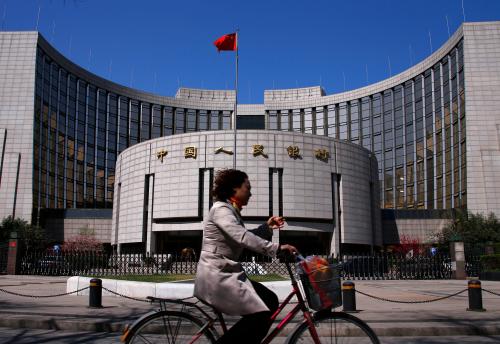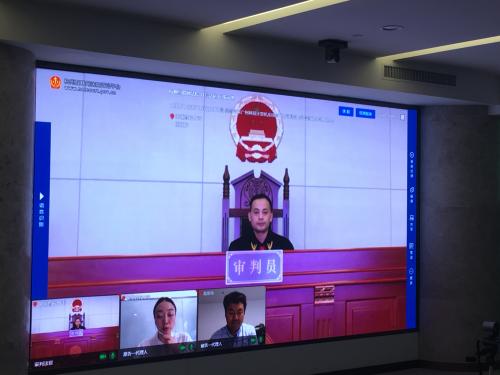Content from the Brookings-Tsinghua Public Policy Center is now archived. Since October 1, 2020, Brookings has maintained a limited partnership with Tsinghua University School of Public Policy and Management that is intended to facilitate jointly organized dialogues, meetings, and/or events.
This is the second of two posts about blockchain development in China. You can read the first post about startup businesses and the response from the national government here.
The absence of a national standard of regulation allows local governments in China to step into the blockchain business. Major cities in China are now competing for supremacy by creating an ecosystem of blockchain. According to statistics by Jingdata, Beijing and Shanghai host the highest shares of Chinese blockchain companies, with 36 percent and 20 percent respectively, followed by Shenzhen and Hangzhou. Several other major cities across China have started their blockchain-related investments funds: in July 2018, Nanjing announced an ambitious $1.5 billion investment fund to promote blockchain projects and encourage startup companies to move to the city.
Beijing and Shanghai
According to the research by Block-45, a Chinese blockchain media outlet, projects in Beijing mainly concentrate on cryptocurrency exchanges and mining machine manufacturing, both lucrative businesses in the blockchain industry. The most highly paid job offered by Beijing-based blockchain companies is around RMB 100,000 (USD $14,690) monthly. By contrast, startups in Shanghai focus more on the application of blockchain technology than on cryptocurrencies. More than 30 percent of those startups are in the financial services industry. They adopt technology like digital identities and smart contracts to facilitate financial services. Yet, neither Beijing nor Shanghai has issued any clear regulatory policy, except few mentions in government documents.
Hangzhou
The government of Hangzhou has played a pioneering role in promoting blockchain technology by addressing its importance in a 2018 government report. Zhejiang Daily, the official newspaper of Zhejiang province, reports that Hangzhou is determined to become the No.1 city globally for blockchain-backed business. The home of Alibaba, Hangzhou established China’s first blockchain-centered Industry Park in April 2018. The government of Yuhang District, a suburb of Hangzhou, and a local venture capital firm jointly set up a fund valued at RMB 10 billion (USD $1.6 billion) to finance blockchain startups. So far, Industry Park has successfully contracted with ten blockchain-related projects. One startup, Jixin Blockchain, is developing a more user-friendly wallet application to help customers protect their digital currencies from theft and loss. By doing so, they aim to make digital wallets more accessible to the public.
Shenzhen
Like Hangzhou, Shenzhen also wants to maintain a lead in developing blockchain technologies. With strong electronic product manufacturing capabilities, Shenzhen has become a center for manufacturing and sales of mining machinery, which attracts buyers from all over the world. However, Shenzhen’s involvement in blockchain extends far beyond supplying mining machines. In 2016, Shenzhen established China’s first Financial Blockchain Consortium, which aims to create coordination mechanisms for financial blockchain technology research and development. Recently, the Shenzhen government launched a venture capital fund up to RMB 500 million ($79 million) to identify promising projects and build a vibrant blockchain ecosystem in the city. Shenzhen Institute of Innovation and Development is responsible for collecting over 100 blockchain-related projects to finance them for the venture capital fund.
Academia
China’s leading universities are devoting resources to develop blockchain-related technologies and talents. Their efforts demonstrate the growing interest from China’s academic institutions in the area of blockchain. In 2016, Tsinghua University, together with IBM and Walmart, announced that they are using blockchain technology to improve the way food is tracked, transported, and sold to consumers across China. Now, Tsinghua is one of the eight Chinese universities that offer blockchain-related classes.
Zhejiang University, located in Hangzhou, offers a blockchain and digital currency course. This course teaches students the technology behind blockchain platforms like HyperLedger, and offers case studies in blockchain application and cryptocurrencies. The university has provided talent to the blockchain industry, graduating the founders of startups such as Hyperchain and Yunphant. New data published in February by China State Intellectual Property Office highlights the efforts by the university to patent blockchain applications developed on campus, such as a cloud-based blockchain system that facilitates cross-border payment transactions. Zhejiang Daily also attributes Hangzhou’s success of developing blockchain technology to Zhejiang University.
Suzhou, a city of Jiangsu province, wants to copy Hangzhou’s success in terms of developing blockchain technologies, so it set up special fund valued at RMB 1 billion ($157.7 million) to support the establishment of a “Blockchain Valley” through collaboration with Tongji University. The Blockchain Valley will attract blockchain-related enterprises and talent in order to apply this cutting-edge technology to every aspect of public service.
A Bright Future
China has not only actively developed blockchain-based business domestically, but also gradually increased its global engagement. China, together with the U.S., U.K., Canada, Germany and 17 observing countries, is participating in International Technical Committee for Blockchain Standards, called ISO’s TC 307 committee, in order to produce a range of deliverables such as standards. To enhance global engagement, the government-backed Investment Association of China announced plans in March to create a blockchain investment development center for linking domestic and international resources, attracting foreign investment, and leading international blockchain forums.
In addition to participation in agenda setting, China tops other countries and leads blockchain patent applications in 2017, according to data from the World Intellectual Property Organization. China nearly quadrupled its number of such filings in 2016. Although a patent doesn’t necessarily lead to viable product or use case, it provides the owner an advantage and sets barriers for latecomers.
China’s interest and investments in blockchain are significant. Due to the organic, bottom-up, nature of these efforts, China has not yet leveraged synergies that come from coordinated efforts and scale. In our estimate, those days are quickly approaching, and China is poised to retain a leadership position in this space for some time.









Commentary
How China’s local governments and academia propel blockchain business
August 1, 2018